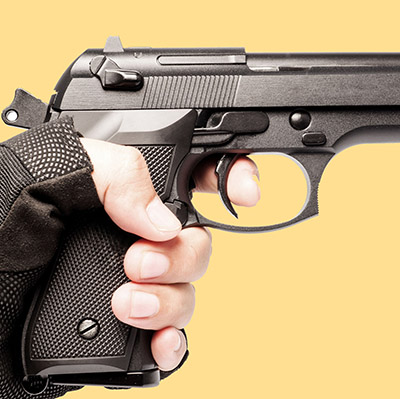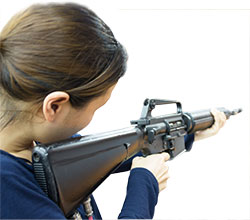| Women, Guns, and Regulation | |||
| by Nathalie Gagnon-Joseph | |||
|
|||
There's a fancy holster on the market today. It comes in all shapes, colors, and sizes and was designed for women. It's made by Designer Concealed Carry, a company founded by Kate Woolstenhulme, and is one of several companies that make high-end handbags that double up as gun holsters. Women don't immediately come to mind when talking about guns, but they are the fastest-growing segment to participate in shooting sports, the National Shooting Sports Foundation says. According to the foundation's surveys, most women decide to carry for protection. Respondents also mentioned hunting and shooting with family and friends. Despite this growing trend, statistics indicate that the number of women who hunt or carry a firearm for protection is still small. According to a recent study by Harvard Injury Control Research Center and Marie Claire magazine (February 2016), 12 percent of women own a gun, 57 percent of whom said protection against strangers was their main reason for owning a firearm. A majority of these gun-owning women claim that having a gun at home makes them feel safer, whereas only 20 percent of the general population of women believe that gun ownership equates with greater personal safety. Most women favor increased gun regulations: that same survey revealed that 62 percent of women say that laws governing gun sales should be stricter, and about the same percentage want gun laws to be a major topic in the coming presidential debates. Domestic violence is often cited as an argument in favor of firearms regulation in Vermont. In many cases, women are the victims of domestic violence and firearm-related injuries or deaths, says Sue Minter, the Democratic candidate for governor. According to the Vermont state Domestic Violence Fatality Commission Review Report 2015, 50 percent of all homicides committed 1994–2014 were domestic violence related, and of those, 57 percent were committed with firearms. During this same 20-year period, over 80 percent of all Vermont's domestic-violence-related fatalities were committed by males, while slightly more than half of the victims were females (51 percent). According to a study by Jacquelyn C. Campbell and others (American Journal of Public Health, July 2003), women, in general, are more likely to be killed or injured if there is a firearm in an abusive home (www.ncbi.nlm.nih.gov/pmc/articles/PMC1447915/). Even if the gun is never shot, victims have been threatened or beaten with it. A Harvard Injury Control Research Center study discovered that guns in homes are more often used to intimidate intimates than to stop crime (www.hsph.harvard.edu/hicrc/firearms-research/gun-threats-and-self-defense-gun-use-2/). Minter supports the Second Amendment but wants to keep guns in the hands of law-abiding citizens. To do that, she is in favor of common-sense regulations in the form of expanded background checks, she says. In states with universal background checks, there are 38 percent fewer femicides, Gun Sense Vermont says (www.gunsensevt.org/why_vt_needs_better_background_checks). Suicide by firearm is another concern in Vermont. In 2013, suicide was the tenth leading cause of death in Vermont, with 113 people taking their own lives. Over half (55 percent) of those incidents involved a firearm. According to an Everytown for Gun Safety study (http://everytownresearch.org/documents/2015/09/suicide-background-check-fact-sheet.pdf) and a Development Research Working Paper Series study (www.econstor.eu/bitstream/10419/45659/1/618473203.pdf), among others, more stringent gun regulations, including universal background checks, have reduced suicide rates. Discussing Vermont statistics in terms of percentages can be misleading though. In the case of domestic violence, though men are often the perpetrators, they are also often the victims, and firearms aren't the only weapon of choice. For example, according to the aforementioned Vermont state report, though 67 percent of the homicides committed in 2014 were attributed to domestic violence that percentage amounts to 10 deaths, four committed with a firearm. That year, only one of the victims was an adult female; four were children and five were adult males. Many believe the low number of incidents in Vermont doesn't warrant an entire new law. Firearm laws in this state are notably lax. Vermont is one of only four states in the US that allows anyone to carry concealed weapons without a permit; the other three are Alaska, Arizona, and Wyoming. Vermont is also one of the few states that allows citizens younger than age 21 to carry; anyone age 16 or older can carry a handgun openly or concealed. There is no waiting period for gun purchases, no registration is required, and the state neither issues nor requires a license or permit to purchase a gun. |
|||
|
|||
"There's nothing about this that's a political ploy," Minter says when asked if including background checks for all arms purchases as part of her running platform was a way to get more votes. Just before she announced she would run for governor, the mass shooting in the Charleston, South Carolina, church happened. Soon after Minter announced she would run, the shooting at the Planned Parenthood in Colorado Springs, Colorado, took place, she says. "I'm the first person running to say this," she says about her position on firearms regulation, implying that it's not likely to make her more popular. Woolstenhulme is in favor of background checks, as long as it's reasonable. "It gets expanded way beyond initial thought," she says about gun regulation. "You get these bills that are so polluted that it gets onerous for everybody involved." Have you ever heard of a gun shop being shot up? asks Hughes. "Shootings happen in gun-free zones." He cites the club shooting in Orlando, Florida, and the church shooting in Charleston, South Carolina, as examples. Whether or not firearms help keep people safe is another heated debate. A study by David Hemenway and Sara Solnick, published in Preventive Medicine in 2015, concluded that "compared to other protective actions, the National Crime Victimization Surveys [NCVS] provide little evidence that self-defense gun use is uniquely beneficial in reducing the likelihood of injury or property loss." This same study—which examined evidence from NCVS, 2007–2011—also found that defensive gun use is very rare. (These surveys are administered twice a year by the Bureau of Justice Statistics and gather information from about 50,000 to 77,000 households.) According to evidence from the NCVS, guns were used defensively in less than 1 percent of attempted or completed crimes. Woolstenhulme herself started carrying a weapon for safety reasons when she lived in Florida. Carrying a firearm in a regular handbag is extremely dangerous, so a specialized handbag is required. After realizing how limited the holster handbag options for women were, Woolstenhulme started her company in 2009 to fix the problem. Her handbags provide dedicated spots for car keys, cards, and pepper spray, as well as a gun, so that the carrier can keep her head up while walking and be aware of her surroundings instead of rummaging in her bag. "My handbags are designed for situational awareness," she says. She did say that a weapon probably wouldn't be beneficial for a woman in a violent relationship, given that her partner would probably know where the weapon is located. The study conducted by Campbell notes that "although the abuser's access to a firearm increased femicide risk, victims' risk of being killed by their intimate partner was lower when they lived apart from the abuser and had sole access to a firearm." Thompson teaches a class that's geared toward women who want to know more about weapons. "Many don't want to learn from a man," she says about those who attend her workshops, which are so popular she's had to turn some people away because there aren't enough spots. One class that dates back to the war in Vietnam is about how to deal with guns that husbands or significant others leave in the house when they go to war. Is it loaded? How should it be stored? Many of the women are more interested in the pistols because they're easier to handle. Although Thompson suspects that some want to learn to handle weapons for protection, no one has actually said so. "Curiosity, that's where it starts," she says. She sometimes carries a firearm but not for protection. To her it's a tool she uses on her farm or for competitions. |
|||
|
|||
adjudicated as a mental defective or committed to any mental institution, illegal immigrants, anyone dishonorably discharged from the Armed Forces, anyone who renounced their US citizenship, anyone with a restraining order for harassment, stalking, or threatening an intimate partner or child, or anyone convicted of a misdemeanor crime of domestic violence. Some states go further than the federal gun laws, for instance, requiring background checks for all gun sales (including private sales), requiring firearms purchasers to have a permit in certain cases, or restricting the purchase of assault weapons. It's easier to get a gun in Vermont than in other places around the country. Only licensed gun shops in Vermont need to comply with NICS; private and online sales do not have those constraints. A Seven Days journalist was able to buy an AR-15 semiautomatic rifle without a background check in less than a day from an unknown seller he met online. That's the same type of weapon that was used in several mass shootings around the country, he says in his article. Under the legislation that Minter is considering, that type of transaction would become illegal unless a background check is performed. During the primaries, gubernatorial candidate for governor Matt Dunne also spoke in favor of background checks after several mass-shooting events hit the newsstands. "I grew up in Vermont," he says. "They taught hunter safety in our school gym. I, like many Vermonters, thought that we were immune to the issues of gun violence. We have responsibilities beyond our borders. We should be reducing gun violence across our state but also reducing gun violence across the region." Because guns are so easy to buy in Vermont, sometimes people from out of state come here to get them. There have been rumors of guns being traded for heroin, too. Hillary Clinton has mentioned that some of the guns bought in Vermont are used in crimes in other states. According to an article in the Washington Post, New York and New Jersey are tough on firearms, but two-thirds of the firearms involved in crime in those states came from out of state. "With mandatory background checks they think they're going to deter crime," Hughes says about the proposal for universal background checks. "Criminals won't comply." They go toward the black market anyway, he says. "Most states don't have [background checks] for that reason. The only people impeded are law-abiding citizens." Although background checks won't necessarily stop criminals outright, it creates liability for sellers if a gun they sell privately without a background check ends up being used to commit a crime, Minter says. Thompson also questions whether background checks would be beneficial. But she doubts whether they would really affect her, except in one instance: giving a gun to a member of her family. As a competitive shooter, Thompson has many sentimental and collectible weapons that she may want to give to family members. To celebrate 39 years spent in the National Guard, she had a .45-caliber pistol custom made for her. It is engraved with her name, and with a custom serial number that corresponds to her birthday. If she chooses to give a prized gun to a family member who she knows isn't a threat to anyone, it's nobody's business, she says. The legislation that Minter is considering contains some exemptions to the universal background checks: "Expanded background check requirements would not include giving firearms as bona fide gifts to immediate family members, temporarily loaning firearms during hunting and sporting events, transferring a firearm as part of an inheritance and temporarily transferring a firearm for immediate self-defense needs." In its current form, Minter's legislation would ban the sale of assault weapons for nonmilitary purposes, but according to her website, the expanded background checks she is promoting would not prevent a law-abiding citizen from purchasing a firearm. |
|||
|
Nathalie Gagnon-Joseph is a journalist from Montreal, Canada, who lived in the Northeast Kingdom.
|
||


